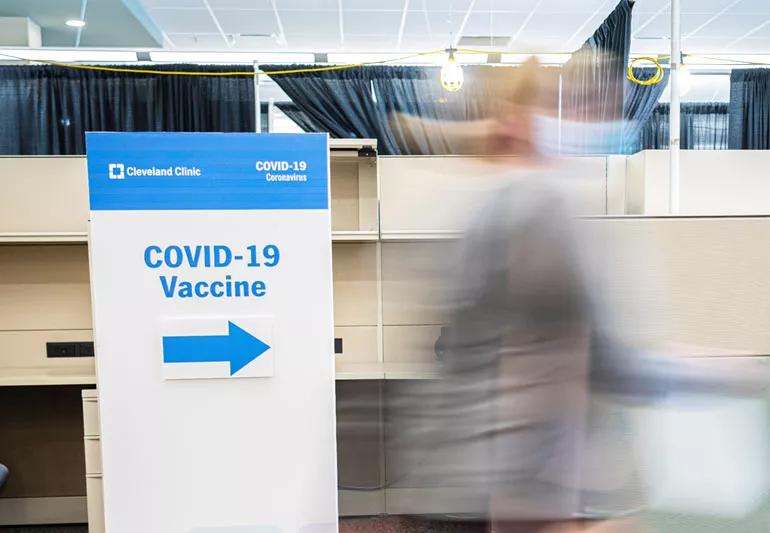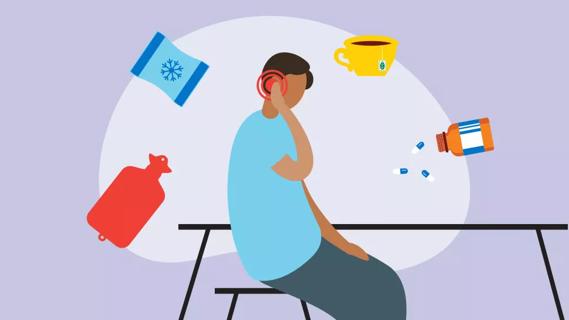Advertisement
If you've had COVID-19, you may think you don't need to be vaccinated. Think again.

Maybe you’ve been through the fever, coughing, and other symptoms of COVID-19 and successfully fought them off. Or maybe you tested positive for COVID-19 but were asymptomatic. Regardless, if you’ve already had coronavirus, you may think you don’t need to be vaccinated for it. After all, your body now has built up antibodies against the virus, so you’re good, right?
Advertisement
Cleveland Clinic is a non-profit academic medical center. Advertising on our site helps support our mission. We do not endorse non-Cleveland Clinic products or services. Policy
Infectious disease expert Kristen Englund, MD says this notion couldn’t be further from the truth.
“Even though you’ve had COVID-19, it’s still very important for you to get the vaccine,” Dr. Englund says. “We know that a small number of people can get COVID-19 a second time.”
She says even if you haven’t had COVID-19 a second time, it’s important you rev up your immune system in case you do see it again. And the vaccine will help you do that.
If you’ve already had COVID-19, aren’t the antibodies your body built up to fight the virus enough to protect you in the future?
“We don’t know how long your immunity will last after you’ve had a natural COVID-19 infection,” says Dr. Englund.
She says recent research focused on how long immunity lasts after having COVID-19 is unclear, and scientists believe it could be up to eight months. But, she clarifies: “The study to determine that information included only 200 patients, so there’s not a whole lot of data yet. And the best way to ensure you’re protected is to get vaccinated.”
Dr. Englund notes that for those who’ve had COVID-19 and have long haul symptoms (also called “long hauler syndrome”), getting the vaccine seems to help them finally recover from those lasting symptoms.
Advertisement
“If you have long COVID-19 at this point in time, please consider getting the vaccine,” Dr. Englund urges. “It is not going to make you worse — and there’s a small chance that it might actually make you feel better.”
“The time frame that we recommend for being vaccinated after having a COVID-19 infection is as soon as you’re out of quarantine,” says Dr. Englund.
There is one caveat, however.
If you’ve received monoclonal antibodies, you must wait 90 days after recovering from COVID-19 to receive the vaccine. According to the Food and Drug Administration (FDA), monoclonal antibodies are proteins made in a laboratory that mimic your body’s immune response. Dr. Englund says some people might not need to be hospitalized for COVID-19, but might receive these antibodies from their doctor as an infusion treatment to help fight the virus.
“If you’ve had that monoclonal antibody, it is going to keep you from being able to develop a nice, robust response to the vaccine. So that’s why we have to wait for 90 days until that monoclonal antibody has gotten out of your system.”
If you’ve had COVID-19, what’s the likelihood that you could contract the virus a second time if you don’t get vaccinated against it?
“We’re not seeing very many secondary infections,” says Dr. Englund. But she says it’s also relatively early on in the pandemic. Scientists are still learning about coronavirus, and if you’ve had the virus and aren’t vaccinated, it’s unclear how long it will take before you can be reinfected with COVID-19.
“It’s much better to get yourself vaccinated. Then you don’t have to worry moving forward until we learn more about whether we need booster shots or not,” Dr. Englund clarifies.
Researchers are currently studying whether someone who’s been vaccinated can carry the virus and pass it on to others.
“It’s looking like the vaccine actually cuts down on the transmissibility of the virus. So if you’ve been vaccinated, there’s much less likelihood that you’re going to get exposed to the virus and be able to pass it on to others.”
She clarifies that some of the early data has not been peer reviewed yet, although it has been published. So researchers are still finalizing this information. But she says early research indicates that being vaccinated for COVID-19 can make you 90% less likely to have an asymptomatic infection and transmit the virus to those around you.
“It looks like the vaccine truly is not only protecting you, but it is protecting those around you.”
Advertisement
Advertisement
Learn more about our editorial process.
Advertisement

Infection and inflammation can cause you to lose your voice and have other voice changes until you’re fully healed

Baby’s caregivers should be up-to-date on flu, COVID-19 and Tdap vaccines to protect the newborn in their lives

A COVID-19 infection can bring on depression or anxiety months after physical symptoms go away

Just like the flu, COVID-19 continues to evolve every year with new and smarter variants

The latest omicron subvariants carry specific mutations that may allow the SARS-CoV-2 virus to be better at evading immune protection

Research shows the virus can affect your ability to get or maintain an erection

RSV can lead your child to develop pneumonia and have trouble breathing

Getting vaccinated in October can help protect you against severe illness between November and March

Not all ear infections need antibiotics — cold and warm compresses and changing up your sleep position can help

A glass of lemon water in the morning can help with digestion and boost vitamin C levels, and may even help get you into a better routine